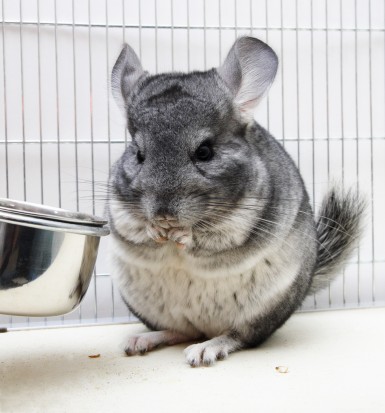
Lymphosarcoma is also known as lymphoma or non-Hodgkin's lymphoma. It is one of the most common cancers treated in practice. Many different species develop Lymphosarcoma.
The most common form of Lymphosarcoma in dogs is that which starts in the lymph nodes. Your dog may feel fine and have no clinical symptoms other than enlarged lymph nodes. Usually the first place this is noticed is under the jaw. Other forms of Lymphosarcoma can start in the chest, abdomen, bone marrow, or skin.
FACT: In advanced cases, the cancer can spread, which vets call "metastasize", to involve multiple sites.
DIAGNOSIS OF LYMPHOSARCOMA
Because Lymphosarcoma can spread to almost any tissue in the body, a thorough work-up needs to be done to determine stage of disease. This lets us know how advanced the disease has become and ultimately helps us decide what treatment would be most beneficial. Typically, staging includes the following tests.
*Cytology - Lymph node cells
* Blood
* Abdominal radiographs
* Abdominal ultrasound
* Bone marrow analysis
It is not always necessary to do all of the tests listed above, however, these help give us an indication of the stage of your pet's cancer and his/her general health and ability to undergo treatment.
STAGES OF LYMPHOSARCOMA
Lymphosarcoma is staged from Stage I to Stage V. Stage I disease means that the cancer is confined to only one lymph node.
State I is rarely diagnosed in pets.
Stage II refers to cancer in more than one node but in one region of the body.
Stage III refers to cancer in nodes generalized in the body.
Stage IV means disease is not only in the nodes but also in the spleen or liver.
Stage V refers to all of the above plus cancer in the bone marrow, blood or other sites not listed above.
There is also a sub classification of "A" or "B". "A" means that the patient is not ill with the disease while "B" means that the patient is showing clinical symptoms such as vomiting, diarrhea, fluid in the lungs, etc.
Stage IIIA is usually the earliest we detect the disease in dogs. Even higher stages of Lymphosarcoma are very treatable.
TREATMENT
Chemotherapy - means "chemical" treatment and refers to drug therapy. Anti-cancer drugs can be administered intravenously, subcutaneously or even orally depending on the drug chosen. Fortunately, animals tolerate these treatments far better than people. The incidence of side effects tends to be less than 5 percent.
Will there be hair loss? In general, no. Exceptions include Poodles, which are at risk for chemotherapy induced hair loss. Old English Sheepdogs are also at higher risk. If any hair is lost, it will regrow after treatment is stopped.
While Lymphosarcoma is a very treatable disease, it is not a curable disease.
What are chances of remission and how long will it last? It does depend on the TYPE of Lymphosarcoma present, but in general, greater than 90% of dogs will achieve a complete remission. The average length of remission is 8-12 months.
What happens after my pet comes out of remission? Your pet can be retreated at that time. Second and third remissions are always possible.
Cost of treatment - Treatment costs can start at $500 and reach $2,000 for larger pets.
RENAL LYMPHOSARCOMA
Renal Lymphosarcoma is the term used when the kidneys are the primary site of involvement. Signs include those of kidney dysfunction/failure; initially cats drink and urinate a lot. Later, cats lose their appetite, vomit and become depressed.
MEDIASTINAL LYMPHOSARCOMA
The Mediastinum is a term used for "lymph" tissue near the heart and lungs. These cats have difficulty breathing because the cancer forms a "tumor" mass in their chest or causes excess fluid to accumulate around their lungs.
BONE MARROW LYMPHOSARCOMA: LEUKEMIA
If the cancer was confined to the bone marrow, it would be called Leukemia. The signs seen would relate to the type of blood cell affected in the bone marrow. The bone marrow normally makes red blood cells that carry oxygen, white blood cells that fight infection and platelets that help blood to clot. A decreased number of these cells as a result of Leukemia would cause: anemia, infections, and bleeding disorders respectively.
DIAGNOSIS
Diagnosis is confirmed by a tissue biopsy, which is a microscopic examination of tissue from the specific site involved.
To completely evaluate a dog suspected of having this type of cancer, a detailed exam is necessary to determine whether or not the cancer has spread to involve any other areas of the body. Veterinary cancer specialists (Oncologists) refer to this as "STAGING". Diagnostic Procedures used to "STAGE" the cancer include:
* Cytology - analyze cells in enlarged lymph node and look at them under microscope. Removing a few cells with a needle gives a good idea of what's going on.
* Blood tests.
* X-Rays
* Ultrasound
* Bone Marrow Analysis
Once the extent of the cancer is determined by STAGING, the best treatment can be determined.
TREATMENT
Ninety percent of dogs treated with chemotherapy go into remission, which means the cancer is no longer detectable. Remission is not a cure, but it does allow good quality of life. Eight to Ten Months is the average remission and survival time. Unlike humans, less than five percent of dogs experience serious side effects from Chemotherapy, which can include:
* Vomiting
* Diarrhea
* Appetite Loss
* Lethargy
Dogs don't lose their hair like people (except Poodles, Old English Sheepdogs) do with Chemotherapy, but some do lose their whiskers.
COMPLEMENTARY TREATMENTS
CANCER DIETS
A good diet and a multi-vitamin mineral supplement are standard for most cases.
NUTRACEUTICALS, HORMONES, HERBS AND OTHER SUPPLEMENTS
There are quite a few considerations that go into designing a supplement program for a cancer patient.
Will the supplement interfere with chemotherapy?
Is immune stimulation potentially harmful?
Has the patient lost his or her appetite due to the illness?
Below is a brief listing of supplements that may be helpful with cancer treatment. No doses are provided because every animal should receive an individual
evaluation.
SUPPLEMENTS TO CONSIDER
Look for the * - these are considered essential supplements:
* FISH OIL OR OTHER OMEGA-3 FATTY ACID SOURCES: fish oil appears to reduce cancer spread; enhance natural defense mechanisms and fight inflammation.
* VITAMIN A: Vitamin A and beta-carotene enhance immune function and may prevent some forms of cancer. Be careful though - a large study suggested that beta-carotene accelerated development of lung cancer in smokers. This might be important if your pet lives with a smoker.
* VITAMIN C: like Vitamins A and E, adequate Vitamin C levels may lower cancer risk; supplementation may enhance effects of cancer therapy and reduce their potential toxicity. The antioxidant function of Vitamin C may also reduce inflammation.
* VITAMIN E: evidence suggests that Vitamin E prevents cancer. Vitamin E does stimulate immunity and may help counteract the side effects of chemotherapy.
*SELENIUM: strongly associated with a decreased risk of cancer; supplementation may reduce side effects of chemotherapy.
COENZYME Q10: may decrease toxicity of the chemotherapeutic drug Adriamycin. Also acts as an antioxidant therefore, enhances immune functions.
* ARGININE: enhances immune function in cancer studies.
PYCNOGENOL: powerful antioxidant comes from grape seed extract.
MELATONIN: suppresses several types of cancer.
GLANDULARS: extracts of thymus gland, for instance, may contain agents called cytokines helpful in managing cancer.
HERBAL SUPPLEMENTS: with anti-cancer effects (note: some of these herbs may be quite toxic - even more so than some chemotherapy drugs in the correct dosage - so only use under the direction of a trained veterinarian): Green tea, Turmeric, Soybeans, Garlic, Carnivora (venus fly trap), Cotis, Oregon Grape, Mistletoe, Chaparral
IMMUNESTIMULANTS:
- Reishi (ganoderma)
- Maitake
- Ashwaganda
- Ginseng
- Astragalus
HOMEOPATHIC TREATMENT OF CANCER
There are veterinarians who specialize in homeopathic treatment, and those who have a special interest in homeopathic treatment of cancer. Any pet owner considering homeopathic cancer treatment should consult a homeopathic veterinarian. This is a brief list of some homeopathic agents often used in cancer treatments and this prescription is best left to the specialists.
- Arsenicum Album
- Arsenicum Iodatum (Ars-I)
- Asterias (Aster)
- Cadmium Sulphide (Cadm-s)
- Calcarea carbonica (Calc or Calc carb)
- Carbo Animalis (Carb an)
- Carbo
- Carcinosic (carc)
- Conium maculatum (Conium)
- Graphites
- Hydrastis (Hydr)
- Mercurius corrosives (Merc cor, Nitric acid (Nit ac)
- Phosphorus (Phos)
- Phytolacca (Phyt)
- Silicea (Sil)
- Sulphur
- Thuja
- Cell salts
- Tumor nosodes - vaccines made from cancer cells
Homeopathic: no food ten minutes before or after
Silicea 6c - give one pellet once every two days for four weeks.
Phosphorus 6c - give one pellet once every two days for four weeks for tumors which bleed persistently.
 Potential Problems With The Anal Glands In Dogs
Potential Problem
Potential Problems With The Anal Glands In Dogs
Potential Problem
 Manchester Terrier Hereditary Health And Genetic Diversity
Manchester Terrie
Manchester Terrier Hereditary Health And Genetic Diversity
Manchester Terrie
 Ten Good Supplemental Foods To Help Combat Problems In Dogs
Ten Good Suppleme
Ten Good Supplemental Foods To Help Combat Problems In Dogs
Ten Good Suppleme
 Caring For Your Pet Hamster
Caring For Your P
Caring For Your Pet Hamster
Caring For Your P
 Best Type Of Diet To Feed Chinchillas
Best Type Of Diet
Best Type Of Diet To Feed Chinchillas
Best Type Of Diet
Copyright © 2005-2016 Pet Information All Rights Reserved
Contact us: www162date@outlook.com